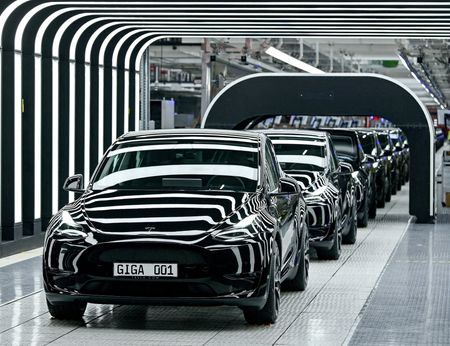 1
1 1
1

By Victoria Waldersee
BERLIN (Reuters) -Tesla Inc has begun assembling batteries in Germany but will focus cell production in the U.S. in light of Inflation Reduction Act tax incentives, a spokesperson said, one of the first firms to declare a strategy shift prompted by the package.
The U.S. electric-vehicle maker is also preparing to produce cell components such as electrodes, some of which will be sent from its site in Gruenheide in the state of Brandenburg, to the United States, the Tesla spokesperson said on Wednesday.
Cars produced at the Brandenburg site would in the “near future” contain batteries assembled locally, the spokesperson added.
“The focus of Tesla’s cell production is currently in the United States due to the framework created by the United States Inflation Reduction Act (IRA),” the company said.
EU leaders have expressed concern that local content requirements of much of the $369 billion of subsidies in the IRA will encourage companies to abandon Europe for the United States.
Tesla rival Stellantis said on Wednesday the IRA was not affecting strategy significantly, while earlier this month industrial gases firm Air Liquide pledged to take advantage of a historic opportunity to invest in clean energy helped by the IRA, but did not give specific details.
Holcim AG, the world’s biggest cement maker, expects the IRA to provide strong momentum for its business in North America, and Linde has estimated the total investment opportunity for the company in the United States alone could exceed $30 billion over the next decade.
The European Commission has proposed loosening rules on state aid for investments in renewable energy, decarbonising industry, hydrogen or zero-emission vehicles, though Germany’s finance minister has warned Europe must not respond to the U.S. act with excessive subsidies.
Tesla withdrew its application for over 1 billion euros in German state aid for the battery plant in November 2021, and the company’s Chief Executive Elon Musk tweeted at that time that “all subsidies should be eliminated”.
However, the carmaker still has an open application for regional funding from the Brandenburg government.
A spokesperson for the German economy ministry said on Wednesday they were “working on clearing up the reasons” behind Tesla’s decision. Brandenburg’s economy ministry said that to its knowledge, the change of course would not impact the number of jobs available at the German site.
Musk said in March 2022 that the German 50 gigawatt-hour battery plant would reach volume production by the end of 2023, but the plant and car production site have hit their targets later than planned.
Tesla has struggled to ramp up battery cell production in Fremont, California, and Austin, Texas, which experts have attributed to new and unproven techniques the company is having trouble scaling up.
It announced in late January it would invest over $3.6 billion to expand its Nevada gigafactory complex with two new factories, one to mass produce its long-delayed Semi electric truck and the other to make its new 4680 battery cell.
(Reporting by Victoria Waldersee; Editing by Mark Potter, Jason Neely and Shounak Dasgupta)